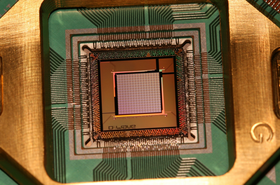Microsoft has developed an in-chip microfluidic cooling system, in collaboration with Swiss startup Corintis.
The company claims that a prototype version of the system, which pushes coolant through tiny channels etched into the chip, removed heat up to three times better than traditional cold plates. It also reduced the maximum temperature rise of the silicon inside a GPU by 65 percent.
As chip densities continue to grow, “if you’re still relying heavily on traditional cold plate technology [within the next five years], you’re stuck,” said Sashi Majety, senior technical program manager for cloud operations and innovation at Microsoft.
Judy Priest, corporate vice president and chief technical officer of cloud operations and innovation at Microsoft, added: “Microfluidics would allow for more power-dense designs that will enable more features that customers care about and give better performance in a smaller amount of space.”
The micro-channels are bio-inspired, akin to the veins on a butterfly’s wing. Microsoft and Corintis said that they used AI to route the channels efficiently for different chip architectures, bringing coolant to semiconductor hotspots.
The hair-sized channels are not without challenges – if they are too deep, they could weaken the silicon; too shallow, and they may clog. Microsoft said that it had developed four design iterations in the past year.
Should the platform be rolled out, it could allow Microsoft to overclock chips for periods of peak demand, rather than deploying more hardware. For example, MS Teams usage spikes at the hour when meetings start, so the chips could overclock during those moments.
With the coolant reaching the silicon, rather than a plate on top of the chip, it also means that it does not need to be as cold. This, Microsoft notes, means less energy needs to be spent cooling the coolant, and that the waste heat will be at a higher grade, as much as 70°C (158°F).
In the future, it could also allow for the development of 3D chips. “We might flow liquid through the chip,” Ricardo Bianchini, Microsoft technical fellow and corporate vice president for Azure, said.
The company did not share any timelines for deploying microfluidics at scale.
Corintis was formed in 2022 out of research from the Swiss Federal Institute of Technology in Lausanne (EPFL). Job listings state that the company is working with “many of the world’s largest tech companies.”
Read the orginal article: https://www.datacenterdynamics.com/en/news/microsoft-partners-with-corintis-for-bio-inspired-in-chip-microfluidic-cooling/









